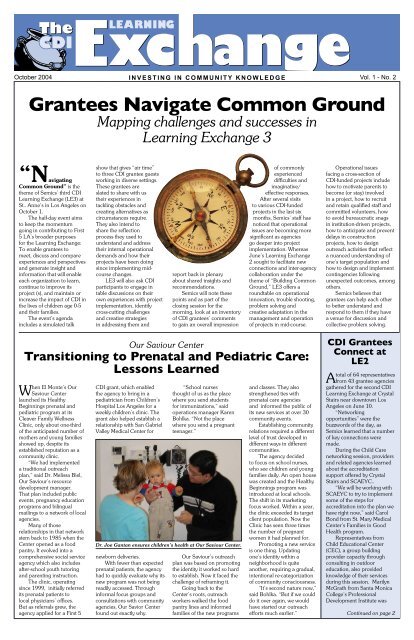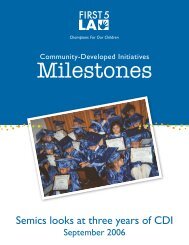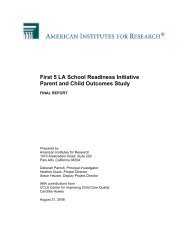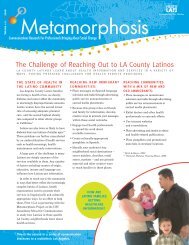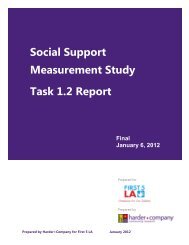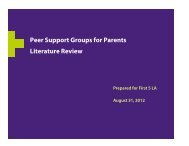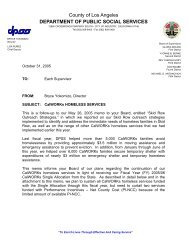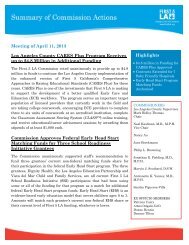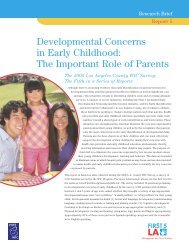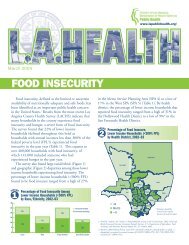The CDI Learning Exchange Vol. 1 No. 2 (October 2004) - First 5 LA
The CDI Learning Exchange Vol. 1 No. 2 (October 2004) - First 5 LA
The CDI Learning Exchange Vol. 1 No. 2 (October 2004) - First 5 LA
- No tags were found...
Create successful ePaper yourself
Turn your PDF publications into a flip-book with our unique Google optimized e-Paper software.
<strong>October</strong> <strong>2004</strong> <strong>Vol</strong>. 1 - <strong>No</strong>. 2<br />
I N V E S T I N G I N C O M M U N I T Y K N O W L E D G E<br />
Grantees Navigate Common Ground<br />
Mapping challenges and successes in<br />
<strong>Learning</strong> <strong>Exchange</strong> 3<br />
“Navigating<br />
Common Ground” is the<br />
theme of Semics’ third <strong>CDI</strong><br />
<strong>Learning</strong> <strong>Exchange</strong> (LE3) at<br />
St.. Anne’s in Los Angeles on<br />
<strong>October</strong> 1.<br />
<strong>The</strong> half-day event aims<br />
to keep the momentum<br />
going in contributing to <strong>First</strong><br />
5 <strong>LA</strong>’s broader purposes<br />
for the <strong>Learning</strong> <strong>Exchange</strong>:<br />
To enable grantees to<br />
meet, discuss and compare<br />
experiences and perspectives<br />
and generate insight and<br />
information that will enable<br />
each organization to learn,<br />
continue to improve its<br />
project (s), and maintain or<br />
increase the impact of <strong>CDI</strong> in<br />
the lives of children age 0-5<br />
and their families.<br />
<strong>The</strong> event’s agenda<br />
includes a simulated talk<br />
show that gives “air time”<br />
to three <strong>CDI</strong> grantee guests<br />
working in diverse settings.<br />
<strong>The</strong>se grantees are<br />
slated to share with us<br />
their experiences in<br />
tackling obstacles and<br />
creating alternatives as<br />
circumstances require.<br />
<strong>The</strong>y also intend to<br />
share the reflection<br />
process they used to<br />
understand and address<br />
their internal operational<br />
demands and how their<br />
projects have been doing<br />
since implementing midcourse<br />
changes.<br />
LE3 will also ask <strong>CDI</strong><br />
participants to engage in<br />
table discussions on their<br />
own experiences with project<br />
implementation, identify<br />
cross-cutting challenges<br />
and creative strategies<br />
in addressing them and<br />
report back in plenary<br />
about shared insights and<br />
recommendations.<br />
Semics will note these<br />
points and as part of the<br />
closing session for the<br />
morning, look at an inventory<br />
of <strong>CDI</strong> grantees’ comments<br />
to gain an overall impression<br />
of commonly<br />
experienced<br />
difficulties and<br />
imaginative/<br />
effective responses.<br />
After several visits<br />
to various <strong>CDI</strong>-funded<br />
projects in the last six<br />
months, Semics’ staff has<br />
noticed that operational<br />
issues are becoming more<br />
significant as agencies<br />
go deeper into project<br />
implementation. Whereas<br />
June’s <strong>Learning</strong> <strong>Exchange</strong><br />
2 sought to facilitate new<br />
connections and inter-agency<br />
collaboration under the<br />
theme of “Building Common<br />
Ground,” LE3 offers a<br />
roundtable on operational<br />
innovation, trouble shooting,<br />
problem solving and<br />
creative adaptation in the<br />
management and operation<br />
of projects in mid-course.<br />
Operational issues<br />
facing a cross-section of<br />
<strong>CDI</strong>-funded projects include<br />
how to motivate parents to<br />
become (or stay) involved<br />
in a project, how to recruit<br />
and retain qualified staff and<br />
committed volunteers, how<br />
to avoid bureaucratic snags<br />
in institution-driven projects,<br />
how to anticipate and prevent<br />
delays in construction<br />
projects, how to design<br />
outreach activities that reflect<br />
a nuanced understanding of<br />
one’s target population and<br />
how to design and implement<br />
contingencies following<br />
unexpected outcomes, among<br />
others.<br />
Semics believes that<br />
grantees can help each other<br />
to better understand and<br />
respond to them if they have<br />
a venue for discussion and<br />
collective problem solving.<br />
Our Saviour Center<br />
Transitioning to Prenatal and Pediatric Care:<br />
Lessons Learned<br />
When El Monte’s Our<br />
Saviour Center<br />
launched its Healthy<br />
Beginnings prenatal and<br />
pediatric program at its<br />
Cleaver Family Wellness<br />
Clinic, only about one-third<br />
of the anticipated number of<br />
mothers and young families<br />
showed up, despite its<br />
established reputation as a<br />
community clinic.<br />
“We had implemented<br />
a traditional outreach<br />
plan,” said Dr. Melissa Biel,<br />
Our Saviour’s resource<br />
development manager.<br />
That plan included public<br />
events, pregnancy education<br />
programs and bilingual<br />
mailings to a network of local<br />
agencies.<br />
Many of those<br />
relationships in that network<br />
stem back to 1985 when the<br />
Center opened as a food<br />
pantry. It evolved into a<br />
comprehensive social service<br />
agency which also includes<br />
after-school youth tutoring<br />
and parenting instruction.<br />
<strong>The</strong> clinic, operating<br />
since 1999, initially referred<br />
its prenatal patients to<br />
local physicians’ offices.<br />
But as referrals grew, the<br />
agency applied for a <strong>First</strong> 5<br />
<strong>CDI</strong> grant, which enabled<br />
the agency to bring in a<br />
pediatrician from Children’s<br />
Hospital Los Angeles for a<br />
weekly children’s clinic. <strong>The</strong><br />
grant also helped establish a<br />
relationship with San Gabriel<br />
Valley Medical Center for<br />
newborn deliveries.<br />
With fewer than expected<br />
prenatal patients, the agency<br />
had to quickly evaluate why its<br />
new program was not being<br />
readily accessed. Through<br />
informal focus groups and<br />
consultations with community<br />
agencies, Our Savior Center<br />
found out exactly why.<br />
“School nurses<br />
thought of us as the place<br />
where you send students<br />
for immunizations,” said<br />
operations manager Karen<br />
Bohlka. “<strong>No</strong>t the place<br />
where you send a pregnant<br />
teenager.”<br />
Dr. Joe Gantan ensures children’s health at Our Saviour Center.<br />
Our Saviour’s outreach<br />
plan was based on promoting<br />
the identity it worked so hard<br />
to establish. <strong>No</strong>w it faced the<br />
challenge of reframing it.<br />
Going back to the<br />
Center’s roots, outreach<br />
workers walked the food<br />
pantry lines and informed<br />
families of the new programs<br />
and classes. <strong>The</strong>y also<br />
strengthened ties with<br />
prenatal care agencies<br />
and informed the public of<br />
its new services at over 30<br />
community events.<br />
Establishing community<br />
relations required a different<br />
level of trust developed in<br />
different ways in different<br />
communities.<br />
<strong>The</strong> agency decided<br />
to focus on school nurses,<br />
who see children and young<br />
families daily. An open house<br />
was created and the Healthy<br />
Beginnings program was<br />
introduced at local schools.<br />
<strong>The</strong> shift in its marketing<br />
focus worked. Within a year,<br />
the clinic exceeded its target<br />
client population. <strong>No</strong>w the<br />
Clinic has seen three times<br />
the number of pregnant<br />
women it had planned for.<br />
Promoting a new service<br />
is one thing. Updating<br />
one’s identity within a<br />
neighborhood is quite<br />
another, requiring a gradual,<br />
intentional re-categorization<br />
of community consciousness.<br />
“It’s second nature now,”<br />
said Bohlka. “But if we could<br />
do it over again, we would<br />
have started our outreach<br />
efforts much earlier.”<br />
<strong>CDI</strong> Grantees<br />
Connect at<br />
LE2<br />
total of 64 representatives<br />
A from 43 grantee agencies<br />
gathered for the second <strong>CDI</strong><br />
<strong>Learning</strong> <strong>Exchange</strong> at Crystal<br />
Stairs near downtown Los<br />
Angeles on June 10.<br />
“Networking<br />
opportunities” were the<br />
buzzwords of the day, as<br />
Semics learned that a number<br />
of key connections were<br />
made.<br />
During the Child Care<br />
networking session, providers<br />
and related agencies learned<br />
about the accreditation<br />
support offered by Crystal<br />
Stairs and SCAEYC..<br />
“We will be working with<br />
SCAEYC to try to implement<br />
some of the steps for<br />
accreditation into the plan we<br />
have right now,” said Carol<br />
Bond from St. Mary Medical<br />
Center’s Families in Good<br />
Health program.<br />
Representatives from<br />
Child Educational Center<br />
(CEC), a group building<br />
provider capacity through<br />
consulting in outdoor<br />
education, also provided<br />
knowledge of their services<br />
during this session. Marilyn<br />
McGrath from Santa Monica<br />
College’s Professional<br />
Development Institute was<br />
Continued on page 2
www.cdilearningexchange.com<br />
Inside Semics2<br />
<strong>October</strong> <strong>2004</strong> <strong>Vol</strong>. 1 - <strong>No</strong>. 2<br />
I N V E S T I N G I N C O M M U N I T Y K N O W L E D G E<br />
Semics Project Analysts –<br />
Coming Your Way!<br />
Since the beginning of its<br />
evaluation of <strong>First</strong> 5’s<br />
<strong>CDI</strong> program, Semics has<br />
assigned site teams of two<br />
– a research associate and<br />
a senior research associate<br />
- to work with the 54 <strong>CDI</strong><br />
grantee agencies. But now<br />
that the funding cycle for a<br />
number of <strong>CDI</strong> grantees has<br />
ended or is anticipated to end<br />
soon, Semics has recently<br />
re-arranged its site team<br />
configuration to shift site loads<br />
and work with grantees in an<br />
even better and more involved<br />
capacity.<br />
<strong>No</strong>w, Semics will be<br />
sending one of its staff<br />
members – with the new title<br />
of Project Analyst – to your<br />
agency for site immersion,<br />
Semics’ unique method of<br />
qualitative evaluation.<br />
Through observation,<br />
interviews and other datagathering<br />
methods, Project<br />
Analysts will visit your site and<br />
focus on three areas of inquiry<br />
regarding <strong>CDI</strong> grantees:<br />
Changes in communities and<br />
target population, changes in<br />
the grantee organization and<br />
changes in service delivery.<br />
Semics Project Analysts will<br />
also be using a variety of<br />
Origins of the <strong>Learning</strong> <strong>Exchange</strong><br />
Where Experiment and Experience Collide<br />
<strong>The</strong> idea of a “learning<br />
exchange” is not new. It<br />
originated – and still continues<br />
-- in developing countries<br />
where conceptual notions<br />
about projects quickly give<br />
way to economic, political and<br />
cultural realities.<br />
In 2000, when the<br />
University of the Philippines’<br />
social sciences program was<br />
contracted by the Southeast<br />
Asian country’s Department<br />
of Health to evaluate a multimillion<br />
dollar Urban Health<br />
and Nutrition Project, their<br />
research team soon ran into a<br />
problem.<br />
A tightly<br />
woven<br />
community of<br />
malnourished<br />
families and<br />
children can’t<br />
be divided<br />
into artificial<br />
control and<br />
experimental<br />
groups, only<br />
to inject food<br />
into just one<br />
sector of the<br />
community.<br />
<strong>The</strong><br />
project<br />
involved the<br />
testing of<br />
nutritional interventions<br />
meant to arrest protein energy<br />
malnutrition in Filipino infants<br />
6 to 24 months of age. This<br />
form of malnourishment has<br />
been a serious health crisis in<br />
many Third World countries<br />
for years. <strong>The</strong> Philippine<br />
health department divided<br />
its blighted urban centers<br />
into seven pilot areas, each<br />
in experimental and control<br />
clusters. <strong>The</strong> department<br />
introduced mother’s classes,<br />
weight monitoring and feeding<br />
guidelines in all but in the<br />
experimental clusters, where<br />
a variable was introduced:<br />
Cereals, vegetables and other<br />
protein-rich food products<br />
were given to families.<br />
Bureaucratic and<br />
economic realities quickly<br />
undermined the experimental<br />
research design. Delays in<br />
the release of funds undercut<br />
the distribution of the food<br />
in major sectors of the<br />
community. Local government<br />
officials reacted by creating<br />
local feeding programs<br />
in areas that the health<br />
department had designated for<br />
its control clusters, rendering<br />
the experimental variable –<br />
the injection of supplemental<br />
food resources – meaningless.<br />
<strong>The</strong> research team had<br />
to choose between writing<br />
Open forums like this one in the Philippines are examples of<br />
learning exchanges overseas.<br />
an artificial report based on<br />
an experimental variable<br />
that had no real existence,<br />
or immersing themselves in<br />
the community and report on<br />
what was actually happening.<br />
<strong>The</strong> team chose the latter<br />
and discovered a rich vein<br />
of informal dialogue among<br />
project coordinators, teachers<br />
and community volunteers<br />
about how to render<br />
meaningful a government<br />
experiment that had lost<br />
its connection with the<br />
community. <strong>The</strong> researchers<br />
formalized the dialogue<br />
by facilitating a traveling<br />
nationwide open forum across<br />
all of the designated urban<br />
pilot areas.<br />
evaluation tools, selected to<br />
most appropriately fit your<br />
project’s aims and other<br />
characteristics.<br />
Other exciting changes<br />
include internal discussion<br />
groups, a feedback system<br />
and inter-grantee focus groups<br />
-- think of them as mini-<br />
<strong>Learning</strong> <strong>Exchange</strong>s.<br />
For more information<br />
on Semics’ improved and<br />
expanded <strong>CDI</strong> evaluation<br />
methods, feel free to contact<br />
your Project Analyst or any<br />
Semics staff member at the<br />
<strong>Learning</strong> <strong>Exchange</strong>.<br />
<strong>The</strong> forum shifted the<br />
spotlight onto a number of<br />
spontaneous community<br />
innovations. Researchers<br />
learned that parenting class<br />
teachers made home visits<br />
to help increase attendance.<br />
Program coordinators used<br />
their own money to buy visual<br />
aids and other materials<br />
that were not budgeted for<br />
by the government. Medical<br />
students at local universities<br />
volunteered with weight<br />
monitoring and other facets<br />
of the program that were<br />
delayed or lost in the process.<br />
In scientific research, these<br />
factors are<br />
abstractly made<br />
“neutral” for<br />
purpose of<br />
creating clean<br />
measurement<br />
of a single<br />
variable. But<br />
community<br />
workers know<br />
that this is<br />
impossible,<br />
particularly<br />
when a<br />
community is<br />
suffering.<br />
<strong>The</strong><br />
nationwide<br />
forum allowed<br />
stakeholders to clarify<br />
what it took to address<br />
nutritional issues among<br />
diverse communities. It<br />
also demonstrated a more<br />
ecological understanding<br />
of community and the<br />
ripple effects of government<br />
intervention.<br />
Our <strong>Learning</strong> <strong>Exchange</strong><br />
borrows from this and other<br />
similar practices around the<br />
world. <strong>The</strong> hope is that it will<br />
benefit all of us – children,<br />
parents, implementing<br />
agencies, evaluators and <strong>First</strong><br />
5 <strong>LA</strong>. Of course, it still needs<br />
to be translated into a form<br />
that makes sense for our<br />
own context in Los Angeles<br />
County.<br />
Continued from Page 1<br />
<strong>CDI</strong> Grantees Connect at LE2<br />
Grantees learn, network at June’s <strong>Learning</strong> <strong>Exchange</strong> 2.<br />
inspired to explore ways CEC<br />
might support her institute in<br />
its capacity building among<br />
providers in the Santa Monica<br />
area. CEC representatives,<br />
though Semics, connected<br />
with representatives from the<br />
Korean Youth Community<br />
Center, which hopes to<br />
incorporate aspects of CEC’s<br />
approach to early childhood<br />
education into their new<br />
facility.<br />
Groups providing<br />
parenting programs as well<br />
as health and literacy classes<br />
shared resources in their<br />
sessions. Monrovia Unified<br />
School District’s Bookmobile,<br />
Harbor Interfaith Shelter, and<br />
WIC decided to combine their<br />
parenting and literacy classes<br />
to maximize use of speakers,<br />
information distribution and<br />
networking opportunities.<br />
Several participants at the<br />
event made known general<br />
needs and services their<br />
groups are able to provide to<br />
other groups. <strong>The</strong> L.A. Gay<br />
& Lesbian Center, which<br />
wanted broader outreach<br />
to their community, offered<br />
diversity training services<br />
to other groups in their<br />
session. El Centro Latino is<br />
developing a computer-based<br />
literacy program, helpful for<br />
the Spanish-speaking target<br />
population.<br />
Happy Bear School’s Casey Dalton (L) and Semics’ Melanie<br />
Stevens exchange information during the lunch break.<br />
<strong>The</strong> <strong>Exchange</strong><br />
<strong>Vol</strong>ume 1 Number 2<br />
<strong>October</strong> <strong>2004</strong><br />
Editors<br />
Don Martinez, Elson Trinidad<br />
“<strong>The</strong>re were more<br />
opportunities to talk to other<br />
agencies to talk about our<br />
programs and issues that<br />
we are experiencing,” said<br />
Wilmington Community<br />
Clinic’s Dolores “Dee”<br />
Clay. “People felt a little<br />
more relaxed, a little more<br />
comfortable with each other<br />
[than at the first <strong>Learning</strong><br />
<strong>Exchange</strong>] and that opened up<br />
the opportunity to have this<br />
kind of exchange.”<br />
Writers<br />
Carol Almeda, Anne Collier-Freed, Don Martinez<br />
Brian Navarro, Lynn Nishimoto<br />
Grant Power, Elson Trinidad<br />
Layout and Design<br />
Jake Reyes<br />
Photographs<br />
Arjuna Soriano, Elson Trinidad<br />
Additional Photographs Courtesy of<br />
Dr. Melissa Biel, Our Saviour Center<br />
Judy Ramos, Friends of the Family<br />
Arielle Rosen, <strong>LA</strong> Gay and Lesbian Center
www.cdilearningexchange.com<br />
Grantee Spotlights3<br />
<strong>October</strong> <strong>2004</strong> <strong>Vol</strong>. 1 - <strong>No</strong>. 2<br />
I N V E S T I N G I N C O M M U N I T Y K N O W L E D G E<br />
Center for the Pacific Asian Family<br />
Meeting the Needs<br />
of the API Community<br />
With many levels of<br />
diversity that exist<br />
within it - from Korean to<br />
Hmong, Thai to Cambodian,<br />
Japanese to Vietnamese - the<br />
Asian and Pacific Islander<br />
(API) community can be a<br />
challenging population to<br />
serve. <strong>The</strong> list is long and<br />
rich with each culture having<br />
its own distinct set of values,<br />
language and customs.<br />
Couple that complex<br />
equation with trying to serve<br />
API women and families<br />
who have been exposed to<br />
domestic violence and sexual<br />
abuse, even bigger cultural<br />
barriers and obstacles need<br />
to be faced. Within the API<br />
community, silence is often<br />
used to protect against<br />
familial and personal shame<br />
and the Center for the Pacific<br />
Asian Family (CPAF) has<br />
been able to navigate through<br />
that very difficult terrain.<br />
<strong>The</strong> agency began in<br />
1978 as the first multi-lingual<br />
hotline assisting API survivors<br />
of domestic violence and<br />
sexual assault. <strong>The</strong>y later<br />
expanded their range of<br />
services, opening the first<br />
multi-lingual and multi-cultural<br />
Emergency Shelter and later a<br />
Transitional Shelter Program.<br />
CPAF’s stated mission is<br />
“to build healthy and safe<br />
communities by addressing<br />
the root causes and the<br />
consequences of family<br />
violence and violence against<br />
women.”<br />
<strong>The</strong>ir approach to service<br />
has always been dedicated to<br />
meeting the specific cultural<br />
and language needs of API<br />
women and their families.<br />
“We look at how each<br />
client defines themselves and<br />
to meet them where they<br />
are,” says CPAF’s executive<br />
director Debra Suh.<br />
From its inception,<br />
Center for the Pacific Asian<br />
Family was well aware of the<br />
very distinct needs of the API<br />
community, understanding<br />
that accessibility is a crucial<br />
part of outreach. CPAF<br />
provides services in 15<br />
different languages to<br />
accommodate the varied<br />
families that seek their<br />
services. <strong>The</strong>y are able<br />
to achieve this broad goal<br />
through staff, volunteers and<br />
partnerships with other API<br />
organizations.<br />
<strong>The</strong> secret to CPAF’s<br />
success is not only its<br />
pioneering work in domestic<br />
violence, sexual assault and<br />
child abuse services in Los<br />
Angeles, but more specifically,<br />
the level of attention and care<br />
paid to each of their clients,<br />
tailoring the services to meet<br />
individual needs.<br />
L.A. Gay & Lesbian Center<br />
Expanding the Concept of Family<br />
Founded in 1971, the L.A.<br />
Gay & Lesbian Center is<br />
the largest gay and lesbian<br />
organization in the world<br />
and the nation’s first to<br />
incorporate the word “gay”<br />
into its name. <strong>The</strong> Center’s<br />
organizational<br />
mission is to<br />
empower the<br />
lesbian, gay,<br />
bisexual and<br />
transgender<br />
(LGBT)<br />
community,<br />
heal the<br />
damage<br />
caused by<br />
discrimination<br />
based on<br />
sexual<br />
orientation<br />
and gender<br />
expression<br />
and identity, advocate for full<br />
access and equality and lead<br />
by example.<br />
“As the LGBT family<br />
community continues to<br />
grow exponentially, the<br />
availability of information,<br />
support and services becomes<br />
more and more critical,”<br />
said Arielle Rosen, family<br />
services manager at the<br />
L.A. Gay & Lesbian Center.<br />
“Thanks to <strong>First</strong> 5 <strong>LA</strong>, the<br />
Center will be able to support<br />
the development of healthy<br />
LGBT families by providing<br />
increased programming and<br />
assistance to ensure that<br />
these families have access<br />
to services that meet their<br />
important and diverse needs.”<br />
Rosen and the rest of<br />
the agency’s staff have been<br />
influential in creating a<br />
Family Day at the Park allows LGBT families to<br />
spend quality time in a welcome environment.<br />
greater sense of community<br />
among LGBT families<br />
throughout Los Angeles<br />
County. <strong>CDI</strong> funding has<br />
allowed its Family Services<br />
Program to diversify its<br />
programming and target<br />
population to better serve<br />
individual LGBT families<br />
as well as the larger LGBT<br />
family community. <strong>The</strong> L.A.<br />
Gay & Lesbian Center has<br />
made a concerted effort<br />
to outreach more LGBT<br />
families, expanding its roster<br />
from about 40 active families<br />
to more than 700.<br />
“<strong>The</strong> families are out<br />
there,” Rosen said, “and they<br />
are hungry for this.”<br />
Some of the programs<br />
that the families are hungry<br />
for, include “Parent & Me”<br />
classes, parent support<br />
groups, community<br />
events, a lending library<br />
and diversity training<br />
for various institutions.<br />
<strong>The</strong> Family Services<br />
Program’s capacity<br />
to serve its diverse<br />
community has continued<br />
to grow, though the<br />
largest impact of their<br />
<strong>First</strong> 5 grant has been<br />
with the individual families<br />
and children that have<br />
participated in programs<br />
funded by <strong>CDI</strong>.<br />
Kim Bergman and<br />
her partner, Natalie, bring<br />
their two daughters to Family<br />
Day in the Park, a monthly<br />
activity that brings LGBT<br />
families together in a safe and<br />
supportive space.<br />
“<strong>The</strong>re are things we can<br />
do to create healthy, happy<br />
families,” said Bergman, also<br />
a trained psychiatrist.<br />
Through the hard efforts<br />
of the Gay & Lesbian Center<br />
with the support of <strong>First</strong> 5<br />
<strong>LA</strong>, significant opportunities<br />
are being created to ensure<br />
children from all different<br />
family models grow up<br />
healthy and school-ready.<br />
Friends of the Family’s<br />
successful <strong>CDI</strong> program,<br />
Project GoodStart (PGS) is<br />
implementing simple, yet<br />
effective strategies.<br />
Expanding on their<br />
already successful existing<br />
parenting and literacy<br />
programs, PGS addresses<br />
multiple needs of the families<br />
they serve. With their target<br />
group being mostly English<br />
as a Second Language<br />
speakers, PGS aims to<br />
address families’ needs for<br />
social support arising from<br />
isolation and for access to<br />
information related to child<br />
health and development. <strong>The</strong><br />
project also addresses literacy<br />
by introducing reading of<br />
translated children’s books<br />
aloud as a tool to enhance<br />
parent-child emotional<br />
bonding while helping parents<br />
to explore sensitive issues<br />
with children, such as sibling<br />
rivalry, divorce and discipline.<br />
Friends of the Family<br />
(FOF) is a non-profit,<br />
community mental health<br />
and family resource center<br />
operating since 1972 in the<br />
San Fernando Valley and<br />
the greater Los Angeles<br />
area. FOF has developed<br />
an organizational culture<br />
in which learning is prized.<br />
Friends of the Family’s Project GoodStart<br />
Adding Value to Community and Organization<br />
This has allowed FOF<br />
not only to learn from the<br />
implementation of PGS, but<br />
to develop its organizational<br />
culture in significant ways.<br />
PGS classes address<br />
multiple needs of their<br />
families through simple<br />
but well-defined strategies<br />
developed in the United Wayrun<br />
Motheread literacy and<br />
parent education curriculum,<br />
of which the bi- and multilingual<br />
facilitators are trained<br />
in.<br />
By sharing high<br />
quality children’s books<br />
and encouraging parents<br />
to read aloud and discuss<br />
the stories in class, these<br />
skilled facilitators are able<br />
to teach much more than<br />
literacy. In many ways, they<br />
serve as parent mentors by<br />
modeling not only reading<br />
techniques, but also ways to<br />
talk with their children about<br />
sensitive issues that the books<br />
introduce. By sharing their<br />
own stories and struggles in<br />
raising their own children, the<br />
program’s facilitators create<br />
a safe environment for and<br />
encourage class participants<br />
to share their own challenges<br />
and struggles.<br />
“My daughter didn’t<br />
speak until the age of two,<br />
and then she began speaking<br />
in full sentences!” exclaimed<br />
Children benefit from the reading programs provided by Friends of the Family’s Project Goodstart.<br />
facilitator Anait Sarkisyan to<br />
class participants.<br />
At times facilitators may<br />
also offer perspectives or<br />
even articles on issues such as<br />
health or child development<br />
as these fit naturally into<br />
group discussions.<br />
“You should not give<br />
a child a book to read as a<br />
punishment—this will lead<br />
the child to associate reading<br />
with a negative experience,”<br />
said Anait, as class members<br />
nodded in agreement.<br />
<strong>The</strong> Motheread<br />
curriculum is well-designed<br />
to address both literacy<br />
and emotional/social<br />
development needs of parents<br />
and children, but success is<br />
not assured. PGS relies not<br />
only on a tried-and-true set of<br />
strategies for its success, but<br />
also on the support system<br />
FOF provides.<br />
FOF’s organizational<br />
leaders have built solid<br />
community support for this<br />
project. Many schools and<br />
Head Start sites not only<br />
provide facilities for PGS<br />
classes, but also provide inkind<br />
staff support such as<br />
referrals and childcare while<br />
parents attend classes.<br />
FOF has also carefully<br />
attended to their staff’s<br />
internal support system. <strong>The</strong>y<br />
have contributed to a strong<br />
team spirit or “passion”<br />
among staff by regularly<br />
inviting them to reflect on the<br />
project’s design and goals.<br />
“Most of the facilitators<br />
have three or more advanced<br />
trainings in Motheread,”<br />
said Deborah Davies, PGS<br />
director. “<strong>The</strong>y are hungry<br />
learners.”<br />
Continued on page 4
www.cdilearningexchange.com<br />
Fun & Announcements4<br />
<strong>October</strong> <strong>2004</strong> <strong>Vol</strong>. 1 - <strong>No</strong>. 2<br />
I N V E S T I N G I N C O M M U N I T Y K N O W L E D G E<br />
Continued from Page 3<br />
Adding Value...<br />
Facilitators are also<br />
able regularly to process<br />
their in-class experiences<br />
with each other during<br />
weekly team meetings.<br />
In addition, newer staff<br />
members are mentored<br />
by their experienced<br />
counterparts. Staff<br />
members at all levels of the<br />
project were engaged in<br />
the process of creating a<br />
comprehensive evaluation<br />
tool for the project. This<br />
not only ensured that staff<br />
understood the purpose<br />
and goals of the evaluation<br />
instrument, but gave them<br />
a sense of enthusiasm for<br />
implementing this part of<br />
project as well.<br />
Because FOF has<br />
developed an organizational<br />
culture that nurtures among<br />
staff passion and commitment<br />
to serve the community<br />
and to adopt practices that<br />
promote organizational<br />
learning, it has been able<br />
to take good advantage of<br />
the resources and “added<br />
value” Project GoodStart has<br />
brought to the organization.<br />
FOF has extended its<br />
visibility in he community<br />
it serves and deepened<br />
relationships with other<br />
organizations and leaders as<br />
a result of their <strong>CDI</strong> project.<br />
A recent community event<br />
originally planned for 300,<br />
attracted around 800 parents<br />
and children.<br />
“We own it now!”<br />
said Friends of the Family<br />
administrator Lisa Hirsch<br />
at <strong>Learning</strong> <strong>Exchange</strong> 2,<br />
commenting on the “added<br />
value” for her organization<br />
generated by PGS.<br />
<strong>The</strong> value added by<br />
<strong>CDI</strong> funding has turned<br />
to permanent value for an<br />
organization ready to its<br />
resources wisely to serve<br />
both the community and<br />
the organizational learning<br />
process itself.<br />
Community<br />
Calendar<br />
<strong>October</strong> <strong>2004</strong><br />
<strong>The</strong> HELP Group<br />
<strong>The</strong> HELP Group Summit<br />
<strong>2004</strong><br />
Oct. 8 - 9<br />
<strong>The</strong> Radisson Hotel - <strong>LA</strong>X<br />
Los Angeles<br />
818-779-5212<br />
www.thehelpgroup.org<br />
<strong>No</strong>vember <strong>2004</strong><br />
<strong>CDI</strong> Word Search<br />
E N O Z N F F C C D I L E J B<br />
L V O Z E S E O K T N Q W H P<br />
Z E A I I M M G I C I L A F B<br />
S Y A L T M R N I P T M R P X<br />
R C T R U A S W X G I Y C H U<br />
H W K N N A C T S G A C H W A<br />
N D I T A I T U C O T A I C T<br />
L T E D T R N I D G I R L H F<br />
Y E C N L S G G O E V E D Y N<br />
E R A C D L I H C N E T R F L<br />
X H D H T S J J P H F I E G V<br />
G W Z Q V K X M V C U L N F Q<br />
W K Z Z D B X N S V I J F N D<br />
V L H T L A E H D M O H S P W<br />
Q E Z I O U T R E A C H P Q V<br />
What Didn’t Happen at <strong>Learning</strong> <strong>Exchange</strong> 2...<br />
Look for the<br />
following words:<br />
CHILDCARE<br />
CHILDREN<br />
COMMUNITY<br />
EDUCATION<br />
EVALUATION<br />
GRANT<br />
GRANTEE<br />
HEALTH<br />
INITIATIVE<br />
LEARNING<br />
LITERACY<br />
OUTREACH<br />
California Council<br />
of Churches<br />
Faith-Based Childcare Network<br />
Universal Preschool Briefings<br />
<strong>No</strong>v. 3, 7:30 p.m.<br />
Temple Emanu El Preschool<br />
Burbank<br />
<strong>No</strong>v. 4, 1:30 p.m.<br />
Holy Redeemer Lutheran<br />
Church and Child Development<br />
Center<br />
Bellflower<br />
323-256-3162<br />
kathy@calchurches.org<br />
www.calchurches.org<br />
<strong>The</strong> Heart Touch Project<br />
‘Candy Cane Lounge’<br />
Holiday Shopping<br />
Fundraiser<br />
<strong>No</strong>v. 7, 7 - 10 p.m.<br />
<strong>The</strong> Beverly Center<br />
Los Angeles<br />
310-391-2558<br />
alexandr@hearttouch.org<br />
www.hearttouch.org<br />
SCAEYC<br />
National Association for the<br />
Education of Young Children<br />
(NAEYC) Conference<br />
<strong>No</strong>v. 10 - 13<br />
Anaheim Convention Center<br />
Anaheim<br />
800-424-2460<br />
www.naeyc.org<br />
Adele Cadres from Crystal Stairs inspected the damage that<br />
Semics created at her agency’s facility.<br />
Things got a little creepy when Shields for Families’ Aaron<br />
Gardner started channeling spirits from the afterworld.<br />
“<strong>The</strong> name is Bond . . . Carol Bond.”<br />
To end the day, Amanda Bueno sang her rendition of<br />
Whitney Houston’s “Greatest Love of All.”<br />
Child & Family<br />
Guidance Center<br />
In-Home Instruction<br />
Program Graduation<br />
<strong>No</strong>v. 19, 5 - 7 p.m.<br />
Park Parthenia Community<br />
Family Center<br />
<strong>No</strong>rthridge<br />
818-882-3147<br />
www.childguidance.org<br />
December <strong>2004</strong><br />
Children’s Hospital<br />
Los Angeles<br />
Parent Support Groups<br />
for Families of Children with<br />
Spina Bifida<br />
Holiday Potluck Celebration<br />
Dec. 9, 10 a.m. - 12 p.m.<br />
Children’s Hospital Los<br />
Angeles<br />
Los Angeles<br />
323-669-7079<br />
aquiran@chla.usc.edu<br />
January 2005<br />
<strong>LA</strong> Child Guidance Clinic<br />
Statewide Early Intervention<br />
Mental Health Conference<br />
Jan. 27<br />
Burbank Airport Hilton<br />
Burbank<br />
323-766-2360 x3360
For more information contact:<br />
Grant D. Power<br />
at<br />
Semics LLC<br />
3121 W. Temple St., Historic Filipinotown,<br />
Los Angeles, CA 90026<br />
Tel: (213) 251-4080<br />
Fax: (213) 251-4081<br />
E-mail: info@semics.biz or gdpower@semics.biz<br />
www.semics.biz


